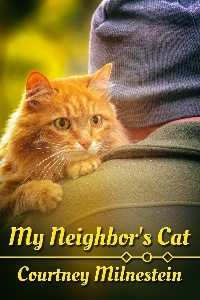In early spring, after the New Year, between Hampstead and Swiss Cottage, a young man finds himself dealing with the sudden and abrupt passing of his neighbor, a situation that obliges him to take on a small cat suddenly orphaned.
Trying to put together what went wrong, searching for answers, something to make sense of the loss, he begins tracing the steps of his neighbor’s life, learning the differences between them, and trying to make peace with his new pet.
This is a story about change, about growing older, and about the things that separate us, regardless of the community we share.

When you grow as the only gay kid on a new estate, you build your idea of what it means to be gay around second-hand information, details gleaned from the world around you. When I first came to London, when I heard Gina G. blasting out of speakers high above a dancefloor slick with spilt beer and flecks of spittle, I felt it was a case of bias conformation; I had been justified in building my musical taste around women dressed in feather boas and go-go boots and a shirtless Robbie Williams surrounded by the guttering flames of candles. Confronted with Samo’s record collection, however, I began to doubt that we had ever been at the same clubs.
Album covers that looked like black and white photocopies of already dimly lit photographs, band logos that seemed so intricately constructed that they resembled nothing more than the casting of sticks about in a random arrangement.
I’ve never been one of those people who believes that music, or games, or whatever, can influence someone to take their own life, and even if I did, I feel the argument holds up even less well when we are discussing responsible adults, not emotional teenagers, but looking through those records, I did begin to wonder how someone could voluntarily let so much sadness in, so much anger, through the music that they listened to, and not feel it in some shape or form.
There were a handful of records that I recognized, things that did not seem so bleak, Depeche Mode, that kind of thing, but it felt like we had very different ideas of what a band such as that meant; I had always listened to them because I listened to Erasure, because I listened to New Order. I knew exactly one whole Joy Division song, and I had never stopped to think about what it meant until years later when I read some book about bands from Manchester and first encountered the very sad context of the real-life events behind it.
Finding Depeche Mode albums amidst the records under Samo’s bed made me feel as if there was some hidden geography of music that connected them with the bleaker, sadder, angrier albums that they had been stored amongst, a connection I had never predicted and could never understand.
It was whilst going through these records, pushed in between Songs of Faith and Devotion and Ultra, that I found a photograph that gave me pause, a sharp stabbing sensation in my chest, the kind they warn you about if they believe you to be at risk of deep vein thrombosis, I imagine.
Looking down at the picture, the folds from where it had been screwed up smoothed out by the life it had lived crushed between LPs, I found myself confronted by a younger Samo, younger even than when I had met him, a heavy leather jacket about his shoulders, a can of Polish beer raised towards the unknown photographer, his other arm around a boy, still seemingly a teenager, traces of acne about the nose and in clusters on the cheeks, a brush of mousey brown hair, glasses that seemed too big for his face.
Behind them was a lawn of green grass and a red brick building, a number of other figures littering the background, some crouched, some standing, everyone with a can of beer in their grasp. A venue or something, maybe, an event of some kind? I flipped over the photograph, and found what I recognized as Samo’s spidery handwriting, the ink somewhat faded.
T Chances, summer ’05 -- w/ Martin.
“T Chances?” I said aloud, turning the photograph over again, finding myself once more confronted with the image of the past, Samo, a broad smile upon his lips, the boy nervously held at his side.
Placing the photo down for a moment, and reaching for the phone in my back pocket, it took me less than a minute to find a Facebook page informing me that the T stood for Tottenham, and the location was a community venue just off Seven Sisters Road.
I turned to the photograph again, and I found myself wondering if there was anyone there who might remember Samo despite the years that had passed, anyone who might remember this boy, Martin. I wondered if the boy might want some of these records, if there might be a better home for them than a charity shop on Finchley Road.
Closing my eyes against the light coming in through the window above the bed, I acknowledged another, unspoken feeling.
I wondered if this boy might be able to tell me why Samo had killed himself. I wondered if he might be able to help dispel this feeling that I had not done anything when I might have been able to help.

